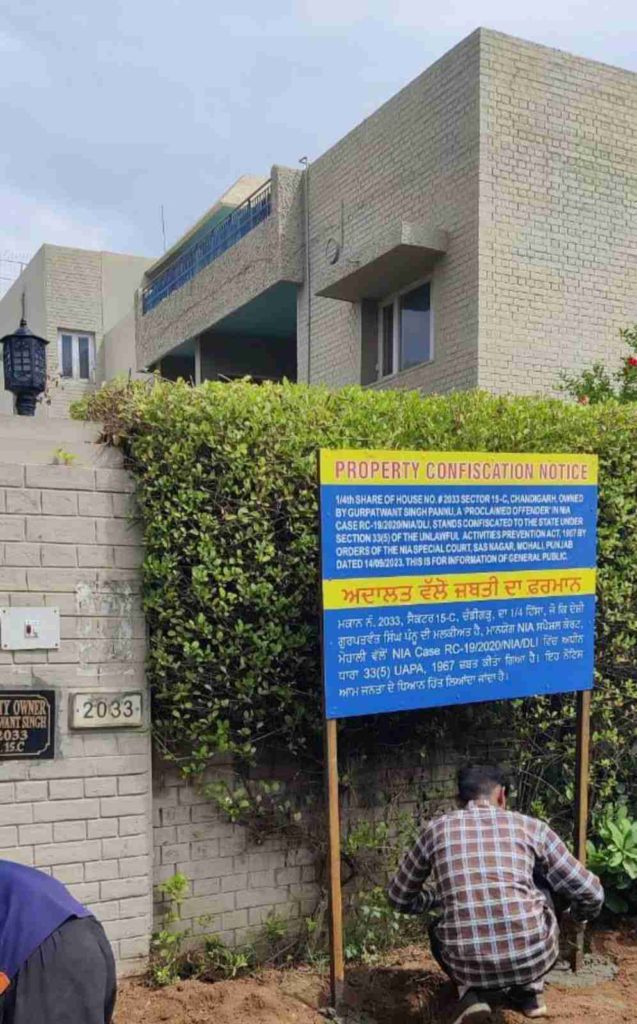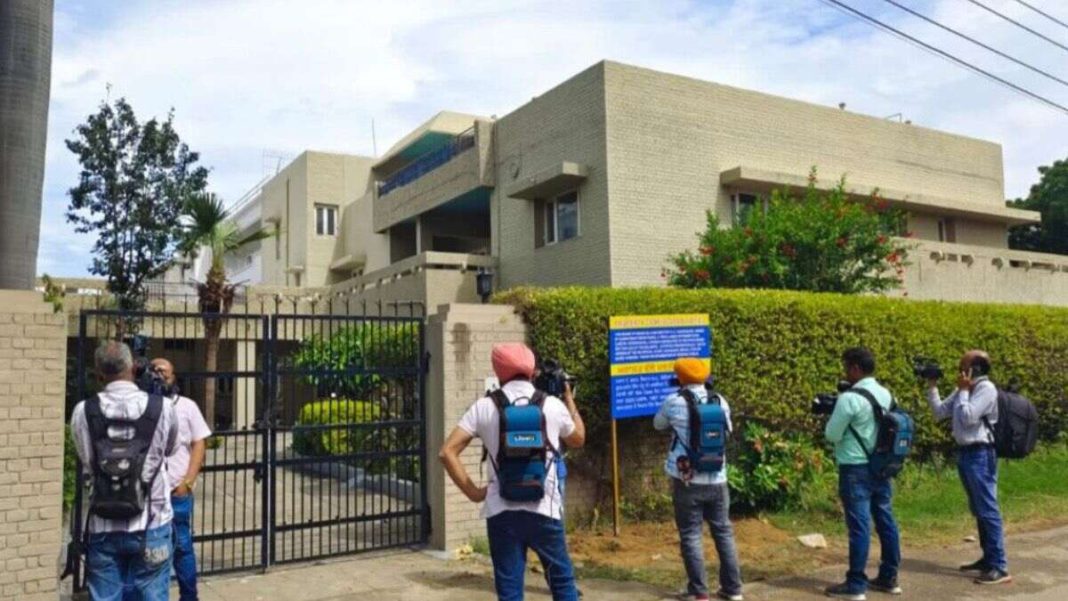INDIA: Securing a tight grip on Gurpatwant Singh Pannu, a “designated individual terrorist” based in Canada, the National Investigation Agency (NIA) on Saturday seized the land and residence of the self-styled General Counsel of the banned Sikhs for Justice (SFJ) organisation in Amritsar (Punjab) and Chandigarh UT.
The significant action, which comes as a major boost to the nation’s crackdown on the terror and separatist network that is being operated from various nations, including Canada, followed confiscation orders issued by the NIA Special Court, SAS Nagar, Mohali.
Pannu has been under the scrutiny of the NIA since 2019 when the anti-terrorism agency filed its initial case against him. He has played a significant role in inciting and carrying out acts of terrorism, as well as sowing fear and terror through threats and intimidation tactics, not only in Punjab but also across the country. On February 3, 2021, the NIA Special Court issued non-bailable warrants for his arrest, and he was officially declared a ‘Proclaimed Offender (PO)’ on November 29 last year.
NIA’s inquiries have uncovered that Pannu’s organisation, Sikhs for Justice, was exploiting the digital realm to indoctrinate vulnerable young individuals and incite them to engage in acts of terrorism. Additionally, the investigations revealed that Pannu was the primary handler and coordinator of SFJ. The Indian government declared Sikhs for Justice an ‘Unlawful Association’ through notification No.S.O. 2469 (E) dated July 10, 2019.
Pannu was officially designated as an ‘individual terrorist’ by the Government of India through Notification No. SO 2170 (E), dated July 1, 2020, has been actively encouraging Punjab-based gang members and young individuals via social media to fight for the cause of an independent state of Khalistan, challenging the integrity, sovereignty, and security of the country, as revealed by NIA investigations.
This is the first time that the properties of an absconding suspect of NIA have been sized under Section 33(5) of UA(P)A.
Pannu has been in the news in recent days for openly making menacing declarations towards senior Indian diplomats and government officials in public arenas. Additionally, he had, a few days ago, directed threats towards Canadian Hindus, urging them to depart Canada and accusing them of taking a “jingoistic approach” by supporting India.
The properties seized today comprise 46 kanal agricultural land in the village of Khankot, Amritsar, one-fourth of House Number 2033, Sector 15/C, Chandigarh (UT).

These properties were previously attached as a result of government orders issued in two distinct cases. The properties have now been seized per the court’s orders under Section 33(5) of the Unlawful Activities Prevention Act (UAPA), 1967. In case RC-19/2020/NIA/DLI, dated April 5, 2020, the properties were registered under sections 120-B, 124-A, 153-A, 153-B, and 17, 18, and 19 of the Unlawful Activities (Prevention) Act, 1967.
The case was first filed at Police Station Sultanwind, Amritsar (City), under File No. 152, dated October 19, 2018, under Sections 124A, 153-A, 153-B, and 120-B of the IPC at Police Station Sultanwind, Amritsar (City), and subsequently transferred to the NIA. In the case (RC-19/2020/NIA/DLI), ten accused—including Pannu—have been charged thus far.
UA(P)A
The Unlawful Activities (Prevention) Amendment Bill is an Indian legal framework designed to prevent and address unlawful associations within India. Its primary goal is to provide the necessary authority to address actions aimed at undermining the integrity and sovereignty of India.
On July 8, 2019, Minister of Home Affairs Amit Shah introduced the Unlawful Activities (Prevention) Amendment Bill 2019 in the Lok Sabha. The bill aims to amend the Unlawful Activities (Prevention) Act 1967.
The most recent amendment to this law, known as the Unlawful Activities (Prevention) Amendment Act, 2019 (UAPA 2019), grants the Union Government the ability to designate individuals as terrorists without adhering to formal judicial procedures. UAPA is also referred to as the “anti-terror law.”
Khalistan and its connection with India
The Khalistani movement emerged in the 1970s and 1980s, demanding an independent Sikh state, Khalistan, in India’s Punjab region. It was rooted in political, religious, and socio-economic grievances among Sikhs.
The term “Khalistan” was coined in the 1940s but became a significant issue in the late 1970s and early 1980s. The movement’s leader, Jarnail Singh Bhindranwale, aimed to assert Sikh rights and autonomy, which ultimately escalated into a violent conflict with the Indian government.
Operation Blue Star in 1984, where the Indian Army stormed the Golden Temple complex in Amritsar, led to widespread unrest and further radicalisation within the Sikh community. Subsequently, the assassination of Prime Minister Indira Gandhi by her Sikh bodyguards resulted in anti-Sikh riots in 1984.
Since then, the Khalistani movement has evolved, with some continuing to advocate for Khalistan while others focus on Sikh rights within the Indian democratic framework. The Indian government has taken various measures to address the concerns of the Sikh community and promote national unity.
Also Read: NIA Releases Names of Terrorists/Gangsters, Some with Canada Links



